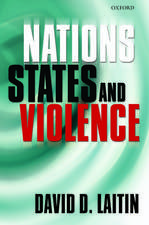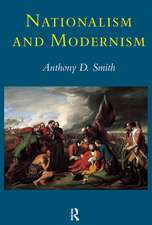Language and Nationalism in Europe
Editat de Stephen Barbour, Cathie Carmichaelen Limba Engleză Hardback – 14 dec 2000
| Toate formatele și edițiile | Preț | Express |
|---|---|---|
| Paperback (1) | 349.00 lei 31-37 zile | |
| Oxford University Press – 3 ian 2002 | 349.00 lei 31-37 zile | |
| Hardback (1) | 1155.82 lei 31-37 zile | |
| OUP OXFORD – 14 dec 2000 | 1155.82 lei 31-37 zile |
Preț: 1155.82 lei
Preț vechi: 1757.05 lei
-34% Nou
Puncte Express: 1734
Preț estimativ în valută:
221.19€ • 229.62$ • 184.44£
221.19€ • 229.62$ • 184.44£
Carte tipărită la comandă
Livrare economică 11-17 martie
Preluare comenzi: 021 569.72.76
Specificații
ISBN-13: 9780198236719
ISBN-10: 0198236719
Pagini: 332
Ilustrații: maps
Dimensiuni: 163 x 241 x 22 mm
Greutate: 0.64 kg
Editura: OUP OXFORD
Colecția OUP Oxford
Locul publicării:Oxford, United Kingdom
ISBN-10: 0198236719
Pagini: 332
Ilustrații: maps
Dimensiuni: 163 x 241 x 22 mm
Greutate: 0.64 kg
Editura: OUP OXFORD
Colecția OUP Oxford
Locul publicării:Oxford, United Kingdom
Recenzii
... excellent ... can be recommended as a reference book and a textbook especially for post-graduate studies.
The papers in this collection provide a detailed and comprehensive account of the different roles language(s) has played in nation-building in Europe. All of the papers are based on the contributors' own research in different parts of Europe, which adds a fresh perspective to the presentations ... Language and Nationalism in Europe is an exceptional collection of essays which should become essential reading for anyone interested in exploring the different roles language has played in the rise of nation-states in Europe.
Remarkable ... Each chapter is full of fascinating sociolinguistic and historical facts but together the volume provides a wide-ranging set of approaches to language and nationalism ... Barbour, Carmichael, and their colleagues have given a wide interdisciplinary readership a very interesting, informative, and readable volume.
Providing a useful introduction to how the linguistic map of Europe has altered over two millennia.
This book gives an insight into why, historically, it has been so difficult to maintain a particular language and how some have even come to constitute a barrier to communication.
The book is accessible to varied audiences: linguists, historians, social and political scientists, anthropologists and any lay person with a general interest in the topic.
The whole field of studies of nationalism is already rich in analyses, but they have tended to indicate the existence of this relationship without deeper investigation. This timely volume admirably fills that gap.
A highly readable and insightful collection.
Excellently edited and printed and certainly [a] valuable addition to the libraries of all those who are fascinated by one of the most exciting topics in modern linguistics.
The papers in this collection provide a detailed and comprehensive account of the different roles language(s) has played in nation-building in Europe. All of the papers are based on the contributors' own research in different parts of Europe, which adds a fresh perspective to the presentations ... Language and Nationalism in Europe is an exceptional collection of essays which should become essential reading for anyone interested in exploring the different roles language has played in the rise of nation-states in Europe.
Remarkable ... Each chapter is full of fascinating sociolinguistic and historical facts but together the volume provides a wide-ranging set of approaches to language and nationalism ... Barbour, Carmichael, and their colleagues have given a wide interdisciplinary readership a very interesting, informative, and readable volume.
Providing a useful introduction to how the linguistic map of Europe has altered over two millennia.
This book gives an insight into why, historically, it has been so difficult to maintain a particular language and how some have even come to constitute a barrier to communication.
The book is accessible to varied audiences: linguists, historians, social and political scientists, anthropologists and any lay person with a general interest in the topic.
The whole field of studies of nationalism is already rich in analyses, but they have tended to indicate the existence of this relationship without deeper investigation. This timely volume admirably fills that gap.
A highly readable and insightful collection.
Excellently edited and printed and certainly [a] valuable addition to the libraries of all those who are fascinated by one of the most exciting topics in modern linguistics.
Notă biografică
Stephen Barbour is a lecturer in German at the University of East Anglia, Norwich. His research and teaching focus chiefly on German language and the linguistics of German, but also include sociolinguistic issues in several areas, particularly in northern Europe. His publications include Variation in German, with Patrick Stevenson (1990; German edn. 1998), and a number of papers on language and nationalism.Cathie Carmichael teaches contemporary European history at Middlesex University. A specialist in the cultural history of south-eastern Europe, she is co-author (with James Gow) of Slovenia: A Small State in the New Europe (2000), and has published articles on popular culture and travel literature. She is currently working on a history of ethnic cleansing in the Balkans, which will appear in 2001.












